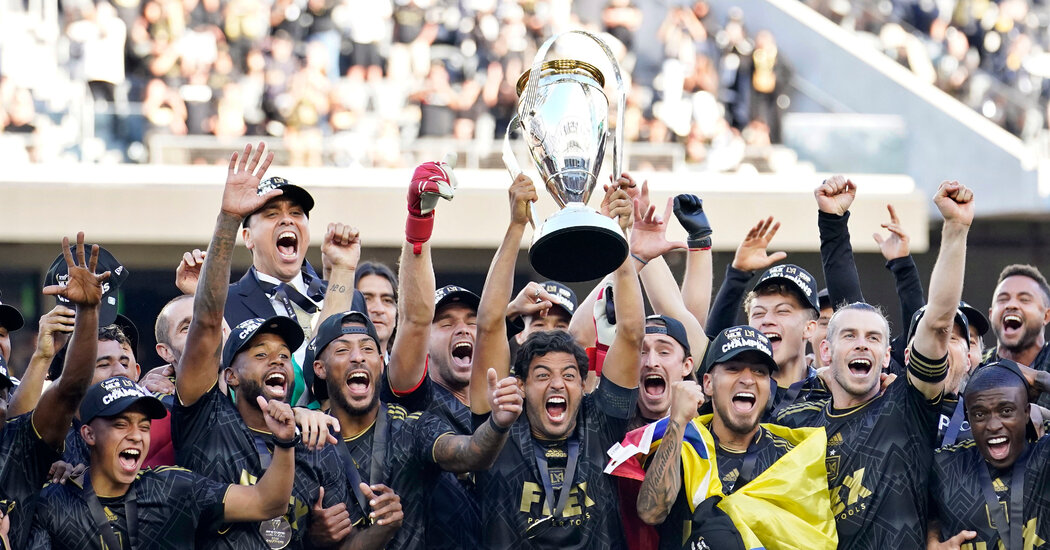
It had taken the finest of margins to separate Los Angeles F.C. and the Philadelphia Union on the final day of Major League Soccer’s regular season, months and months of work all coming down to a tiebreaker to decide the league’s best record. So, it was to be expected, then, that it would take the finest of margins to separate them again when the league’s two best teams met, perhaps inevitably, in Saturday’s M.L.S. Cup final.
Ninety minutes couldn’t decide a winner. Neither could two overtime periods, and 10 more minutes of injury time after that. Six goals. One red card. Seven penalty kicks in a shootout.
Only then could L.A.F.C. claim its first championship, winning by 3-0 on penalties after a 3-3 tie in front of its home crowd at Banc of California Stadium.
The shootout was a stunning finish to a wild day. L.A.F.C. had appeared to win the game with a header late in regulation and then appeared to lose it on a Philadelphia goal in extra time. But Gareth Bale, the Welsh superstar signed to L.A.F.C.’s star-studded roster in midsummer but barely used in the past month, outjumped a defender to score eight minutes into added time, and send the final to a shootout.
“It wasn’t our best day,” said L.A.F.C.’s first-year coach, Steve Cherundolo. “But this team, as it did all year, found a way.”
Bale’s goal canceled out one minutes earlier by Jack Elliott and sent a tense crowd expecting the worst into a deafening celebration.
The noise built kick by kick in the shootout: Philadelphia failed to score on all three of its attempts, and then could only watch while Denis Bouanga, Ryan Hollingshead and Ilie Sánchez coolly finished theirs to finally — finally — finish off one of the most dramatic games in league history.
The final was marred by a violent collision in extra time that saw L.A.F.C. goalkeeper Maxime Crépeau ejected from the game even as medics worked to load him onto a stretcher.
Crépeau appeared to sustain a serious leg injury after charging out to challenge Philadelphia forward Cory Burke for a free ball just outside his penalty area in the 110th minute. Crépeau met Burke just in time to break up the scoring opportunity, but his foul appeared to break his lower leg, and led to a red card.
His ejection left L.A.F.C. to finish the final with 10 players. Bale’s header got them to a shootout, and then Crépeau’s little-used backup, John McCarthy, saved two of Philadelphia’s three attempts there.
Since M.L.S. went away from neutral venues for its title game starting in 2012, the home side had prevailed in seven of the 10 finals. L.A.F.C. continued that trend, but it wasn’t easy.
L.A.F.C. had struck first in the final, when Kellyn Acosta’s free kick deflected in off Philadelphia’s wall midway through the first half. Philadelphia answered early in the second, Daniel Gazdag spinning onto a low lead ball and slotting a shot under the goalkeeper.
The winner appeared to come out of nowhere. A corner won by L.A.F.C., a cross curled in, defender Jesús Murillo rising unchallenged to head in the ball in the 83rd minute.
Its fans were still cheering, still singing Murillo’s name, when Elliott answered for Philadelphia with a header of his own only two minutes later.
The final was the first since 2003 to match the two top teams from the regular season, and it guaranteed a first league title to the winner. Both teams, in fact, were playing in the final for the first time, and their matchup offered an intriguing clash of approaches, if not style: L.A.F.C.’s big-budget lineup studded with imported stars vs. Philadelphia’s more data-driven (and low-cost) methods, which had in recent years produced winning teams that mixed young academy products with reliable veterans.
The teams, at first glance, mirrored age-old stereotypes about their cities: L.A.F.C. brought the star power, in the form of Mexico’s Carlos Vela up front and the European championship pedigrees of Bale and the Italian defender Giorgio Chiellini. Philadelphia, meanwhile, offered a grittier, blue-collar alternative, a team by steadiness, not stars, and anchored by a strong defense that allowed the fewest goals in the league this year. (Philadelphia also quietly led the league in goals, resulting in an astonishing goal difference of plus-46.)
Its climb to the final had been methodical: a Supporters’ Shield in 2020, awarded for posting the best regular-season record, then a trip to the conference final last year (lost after a Covid outbreak decimated the team on the eve of the game) and then this year’s run to the club’s first final.
L.A.F.C., in just its fifth year in the league, had been more hit and miss. Driven by Vela, it won the Supporters’ Shield in only its second season. But it missed the playoffs altogether last season — a difficult thing to do in M.L.S. — before rebounding to finish as the top overall seed again this year. It had actually tied with Philadelphia on points after the regular season, another clue to how little separated the teams, but had two more victories, and thus earned home-field advantage for the playoffs and, crucially, for the final.
The final also ensured M.L.S. would crown a new champion for the sixth year in a row. It took a while, but for L.A.F.C., the wait was worth it.